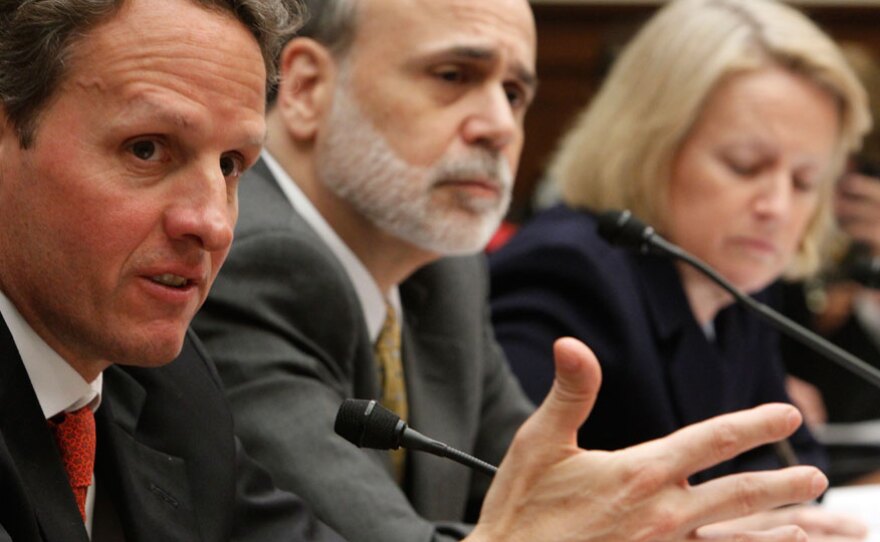An overhaul of financial regulations is needed to help limit the damage to the country's financial system when large investment banks collapse, Treasury Secretary Timothy Geithner told a congressional panel Tuesday.
Testifying before the House Financial Services Committee on the collapse of mammoth investment bank Lehman Brothers, Geithner said the ripple effects from the collapse demonstrate the problem with letting big financial firms operate largely outside the scope of government regulation.
"Any strategy that relies on market discipline to compensate for weak regulation and then leaves it to government to clean up the mess is a strategy for disaster," he warned lawmakers.
Lehman Brothers set off panic in the financial markets when it submitted the largest bankruptcy filing in U.S. history in September 2008.
Geithner was joined at the hearing by Federal Reserve Chairman Ben Bernanke and Securities and Exchange Commission Chairman Mary Schapiro, among others. They fielded questions about Lehman's failure in the face of a recent bankruptcy examiner's report outlining the company's efforts to cover up its massive debt.
The report outlined the company's use of an aggressive accounting device -- known as Repo 105 -- to temporarily move $50 billion in bad assets off its balance sheet. Lawmakers want to know how widespread the use of Repo 105 is on Wall Street, as the Obama administration pushes for passage of tighter financial regulation.
Schapiro said her agency is scrutinizing Lehman's use of the accounting maneuver.
"We're also looking very much at the truthfulness of the disclosure that was in the public documents," she said. The agency has sent a letter to the CEOs of the 19 largest U.S. banks asking them about whether they are employing similar strategies.
Geithner said the overhaul pushed by Senate Democrats would limit the fallout from failures by providing more supervision, transparency -- and government authority to break up firms when they threaten a wider collapse.
"We need a system in which regulators can act pre-emptively to protect, not be left to simply come in after the fact to clean up the mess," Geithner said.
Bernanke told lawmakers the central bank didn't know the investment bank used Repo 105 to temporarily move $50 billion in bad assets off its balance sheet.
Bernanke said the Fed was not Lehman's primary supervisor, and the central bank did everything it could to prevent Lehman's failure by providing emergency liquidity through its discount window.
Although the Securities and Exchange Commission was Lehman's primary regulator, the Fed began monitoring the investment bank because of the problems in the financial industry that led to the sale of investment bank Bear Stearns in 2008.
Regardless, he maintained that no government agency had the authority to require Lehman to operate in a "safe" manner in September 2008.
Lawmakers opened the hearing with statements about the toll Lehman's collapse took on municipalities around the country. Rep. Anna Eshoo (D-CA) said California's San Mateo County alone lost $155 million as a result of the bankruptcy.
Rep. Mary Jo Kilroy (D-OH) said teachers, police officers and other investors lost money when Lehman collapsed.
Former Lehman CEO Richard Fuld said in prepared testimony that he realizes that many people were hurt when the company collapsed, but he insisted he had "no recollection whatsoever" of the Repo 105 maneuvering that undermined Lehman and led to billions in losses.
"I'm very much aware that one day we had a firm, the next day we did not," Fuld said. "A lot of people got hurt by that, and I have to live with that everyday."
Copyright 2022 NPR. To see more, visit https://www.npr.org. 9(MDAzMjM2NDYzMDEyMzc1Njk5NjAxNzY3OQ001))







